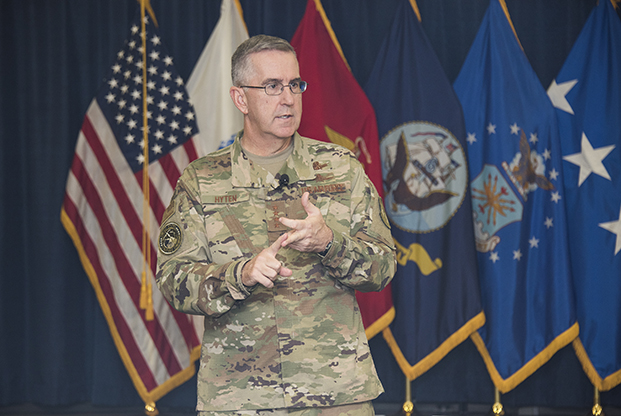
USSTRATCOM Commander Gen. John Hyten, shown here during a Nov. 26, 2019, visit to Defense Information Systems Agency Headquarters at Fort George G. Meade, Md., testified before the Senate Armed Services Committee on Feb. 26, 2019. DISA photo by Michael Romeo.
US Strategic Command will continue sharing some responsibilities for space operations with the future US Space Command as a way to maintain stability, the four-star head of STRATCOM told senators Tuesday.
STRATCOM’s main facility at Offutt AFB, Neb., will serve as an outpost of SPACECOM, dubbed Space Command East if the new command is headquartered in Colorado, or Space Command West if working with a headquarters located in Florida or Alabama, Gen. John Hyten said at a Senate Armed Services Committee hearing.
“I was around when we transitioned the old US Space Command to US Strategic Command in 2002, and now we’re kind of going back the other way,” Hyten said. “I watched us almost break the space mission when we did that, because we just haphazardly slapped billets and said, these 500-plus billets are going to move from Colorado to Omaha and I’ll just say, the people didn’t come with them automatically.”
Strategic forces can support space operations as the new warfighting command stands up this year, and could play the same stabilizing role if the separate Space Force eventually grows into its own department.
Last week, the Trump administration formally announced its plan to draft a legislative proposal to create a Space Force within the Air Force, akin to how the Marine Corps is part of the Navy. The Pentagon will send its blueprint to Congress soon, Hyten confirmed.
He backs the idea of launching a Space Force inside the Air Force because he harbors concerns about creating a new bureaucracy. The space enterprise hasn’t matured enough under one umbrella to warrant its own department, Hyten said, although Trump is keeping the door open to that possibility.
Hyten lamented that nuclear modernization and operations, as well as nuclear command, control, and communications require more of his attention than space. Instead, he wants another commander focused on that domain around the clock.
“Wherever it ends up, we’re going to continue to support that because we don’t know the final destination of where that’s going to be,” he said. “We can’t break the mission because we have threats to deal with today.”